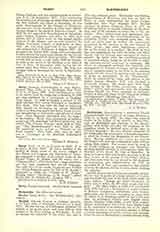

Barthelemy, JEAN-JACQUES, a celebrated French numismatologist and writer, b. at Cassis (Provence), 1716; d. in Paris, 1795. He began his classical studies at the College of the Oratory in Marseilles, took up philosophy and theology at the Jesuits’ college, and finally attended the seminary of the Lazarists, where he devoted most of his time to Oriental languages. He soon became renowned for his scholarship and earnestness in learned researches, in which he rivalled the Humanists of the Renaissance. Having completed his course, he received the tonsure and wore the ecclesiastical habit without taking Holy orders. For several years he lived in his lonely residence at Aubagne, near Marseilles, devoting himself entirely to numismatics, under the direction of his friend, M. Cary of Marseilles. In 1744, he went to Paris and became secretary to M. de Boze, keeper of the medals at the King’s Library, and three years later he was elected to the Academy of Inscriptions and Belles-Lettres. In 1753, he succeeded M. de Boze and remained in this position until the Revolution, during his term nearly doubling the collection.
In 1754, he was sent to Italy on a scientific mission. On his way, he gathered a large number of medals, and conceived the idea of the book which made his name famous, “Voyage du Jeune Anacharsis en Grece vers le milieu du IVe siecle avant Pere vulgaire”. This book, begun in 1756, was not finished until 1788, and was a description of ancient Greece, of Hellenic civilization, institutions, arts, history philosophy, and literature, appealing to every class by reason of its charming narratives and vivid pictures. In successive reprints and English translations (London, 1790, 1800), it still finds readers. Recent archaeological discoveries have shown some of the statements to be erroneous, but on the whole the book remains a very successful attempt to diffuse a correct knowledge of Greek manners and customs. From the time of Barthelemy’s journey through Italy, the Duke of Choiseul had been his patron and had given him many pensions and benefices. After the fall of his friend (1770), Barthelemy followed him into exile at Chanteloup, near Amboise, where unlike the abbes de tour he was busily engaged in polishing his elaborate literary productions. He was elected to the French Academy in 1789. During the Revolution, he was arrested (September, 1793) and confined in a prison for a few days. On his release, he declined to resume his functions as keeper of the medals, and having been despoiled of his fortune by the Revolution died in poverty. Besides the “Voyage du jeune Anacharsis”, Barthelemy has left a number of essays on Oriental languages and archaeology, originally read before the Academy of Inscriptions and Belles-Lettres; “Les amours de Caryte et de Polydore”, a novel illustrating ancient manners; “Un voyage en Italie”; and “Memoires” of his life. His works were edited by Villenave (1821).
LOUIS N. DELAMARRE

